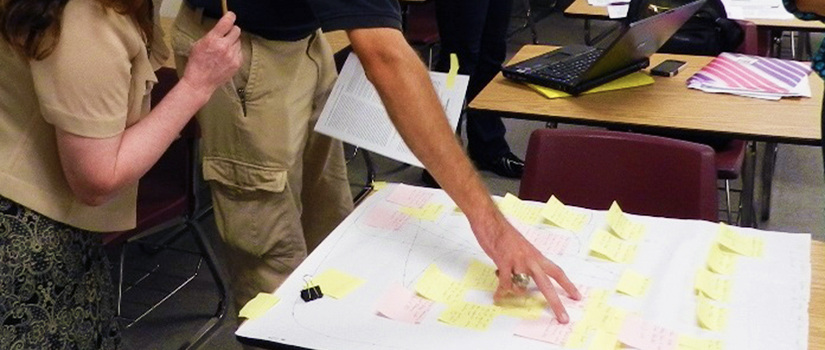Strong research requires the ability to formulate the right research question and to identify relationships between information — skills that College of Education professor Michelle Maher, along with three UofSC civil engineering faculty, Nicole Berge, Sarah Gassman and Charles Pierce, are helping to develop among undergraduate and graduate engineering students.
Maher, Pierce and Gassman received funding last year from the Engineering Information Foundation to develop a course that facilitates the development of research skills in engineering students. The course they developed, ECIV 490/790, also leverages support from an existing NSF CAREER grant awarded to Dr. Nicole Berge.
As one of only 108 research institutions classified by the Carnegie Foundation as "very high in research activity," the University of South Carolina has no shortage of talented researchers who can benefit from Maher's expertise. In her class, Maher is using tools such as concept mapping and use of the "inverted triangle" to teach students how to structure a literature review to formulate their research question.
"Concept maps," Maher explains, "are a schematic representation of relationships between concepts. It is a diagram of labeled 'nodes' or 'bubbles' that represent each journal article that are linked together with directional lines. These nodes are arranged in hierarchical levels that move from general to specific concepts, which allow a person to see the big picture and the gaps in knowledge. Providing a sense of order over the array of articles provides insight into the connection between the articles."
Concept mapping — visual organization of thought processes — was originally developed by Joseph Novak in the 1970s. It is the relationship between information and how it becomes knowledge. Information requires a process to become knowledge. This process begins by defining a question or a problem, and then gathering, organizing, summarizing and communicating the findings.
"We take students through this process" Maher says, "by having them examine the inverted triangles in their concept maps and identify where articles supporting their research question fall — broad, middle or lower level. The concept map is not representative of their whole project. It is just a map of their literature review. It's what they know and can tell you of their topic now — 'This is my research question, here's what I know about it and this is how my articles fit together.' It's an approach that helps to foster critical thinking."
Maher clarifies that an inverted triangle systematically narrows the literature so that it literally "points" to the research question (RQ). Students use and evaluate their literature of journal articles as it relates to their ultimate RQ. Each article represents an argument. Together, multiple articles on the same subject represent a "conversation" among various groups about the topic. The concept maps structure the "conversation" in a way that leads to the RQ and supports why it is important.
Now, with the offering of ECIV 490/790 by Drs. Berge, Pierce, Gassman and Maher, this is the first time that engineering and education faculty have fully collaborated to develop and deliver curriculum informed by both engineering content and education pedagogical expertise. Maher has a unique perspective in that her husband is an engineering project manager employed at the University of South Carolina and she knows from him what to ask. "I understand how their minds work and can relate to how they work in a task-oriented manner" says Maher.
The course has already proven to be successful. In its inaugural semester, the goal for the course each student to be able to submit a manuscript upon conclusion of the course. Within of finishing the course, three-fourths of the class had submitted or were in the final stages of submitting a manuscript.
ECIV 490/790 is a one-of-a-kind pilot course that will serve as test bed for innovative engineering education approaches. Maher anticipates that this course, and concept mapping, will be replicated not only at the USC-Columbia campus, but on campuses nationwide.
